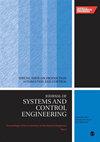在执行器故障和传感器故障情况下,结合事件触发机制和干扰观测器的预测控制方案
IF 1.4
4区 计算机科学
Q4 AUTOMATION & CONTROL SYSTEMS
Proceedings of the Institution of Mechanical Engineers, Part I: Journal of Systems and Control Engineering
Pub Date : 2023-10-31
DOI:10.1177/09596518231204725
引用次数: 0
摘要
由于相互作用的影响和可燃/可燃液体的存在,在相互作用的储罐系统中液位控制面临着巨大的挑战,因为它面临着来自不可测量的干扰、不规则的几何形状和未建模的过程装置动力学的巨大威胁。为了节约能源,对于使用普通泵储存液体,可能优选具有多种几何形状的储罐组合。持续改进风险评估,预测危险情况,实施内在安全控制系统,确保过程安全,从而简化安全操作。从过程分析中可以看出,相互作用槽的动力学对阀系数和泵增益等有效参数非常敏感。为了克服库存或生产的损失,我们研究了一种非线性模型预测控制方案的综合,该方案具有同步状态和参数估计策略的概述。该机制处理随机事件触发的cubature卡尔曼滤波方案,以估计过程状态,同时执行伺服操作。为了减轻工厂的不确定性,减少大扰动的影响,并消除执行器故障/传感器故障的影响,影响模型参数与模型状态同时估计。利用模型状态/参数/故障的预测值进行有效的控制。提出了一种推理非线性模型预测控制范式,其中主要变量借助可测量的次要状态进行测量。为了证明控制框架在安全操作和预防损失方面的实用性和有效性,考虑了一个复杂的工业过程(四倍罐)进行控制,其中系统动力学已经被重新构建。逼真的仿真,如伺服调节合规和消除测量噪声与最先进的模拟器,确保了所提出的方案的有效性。并与传统的非线性模型预测控制律进行了比较研究。为了保证估计量的收敛性和闭环控制器的稳定性,很好地混合了李雅普诺夫定理。本文章由计算机程序翻译,如有差异,请以英文原文为准。
Predictive control scheme by integrating event-triggered mechanism and disturbance observer under actuator failure and sensor fault
Liquid-level control in an interacting storage-tank system exhibits major challenges due to the effect of interaction and the presence of combustible/flammable liquid as it faces huge threats from the unmeasurable disturbances, irregular geometry and unmodelled dynamics of the process plant. A combination of tanks with multiple geometries may be preferred for storing liquids using common pumps for energy conservation. Continuous improvement of risk assessment, predicting hazardous scenarios and implementation of inherently-safer-control systems ensure process safety and, as a result, ease out the safe operation. From the process analysis, it was observed that the dynamics of the interacting tank are very sensitive to effective parameters like valve coefficient and pump gain. To overcome the loss of inventory or production, we investigate the synthesis of a non-linear model predictive control scheme with an outline of simultaneous state and parameter estimation strategies. This mechanism deals with a stochastic event-trigger cubature Kalman filter scheme to estimate process states while performing servo operations. To mitigate plant uncertainty, reduce the impact of large disturbances and nullify the effect of actuator failure/sensor fault, influential model parameters are estimated simultaneously with the model state(s). Predicted values of the model states/parameters/faults are used to derive an effective control effort. An inferential non-linear model predictive control paradigm is proposed, where the primary variable(s) is (are) measured with the help of measurable secondary state(s). To demonstrate the practical utility and effectiveness of the control framework for safe operation and loss prevention, a complex industrial process (quadrupled tank) is considered for control, where the system dynamics have been structured newly. Realistic simulations such as servo-regulatory compliance and elimination of measurement noise with a state-of-the-art simulator ensures the efficacy of the proposed scheme. The results are analysed further for a comparative study with traditional non-linear model predictive control law. To guarantee convergence of the estimator and stability of the closed-loop controller, the Lyapunov theorem is well blended.
求助全文
通过发布文献求助,成功后即可免费获取论文全文。
去求助
来源期刊

CiteScore
3.50
自引率
18.80%
发文量
99
审稿时长
4.2 months
期刊介绍:
Systems and control studies provide a unifying framework for a wide range of engineering disciplines and industrial applications. The Journal of Systems and Control Engineering refleSystems and control studies provide a unifying framework for a wide range of engineering disciplines and industrial applications. The Journal of Systems and Control Engineering reflects this diversity by giving prominence to experimental application and industrial studies.
"It is clear from the feedback we receive that the Journal is now recognised as one of the leaders in its field. We are particularly interested in highlighting experimental applications and industrial studies, but also new theoretical developments which are likely to provide the foundation for future applications. In 2009, we launched a new Series of "Forward Look" papers written by leading researchers and practitioners. These short articles are intended to be provocative and help to set the agenda for future developments. We continue to strive for fast decision times and minimum delays in the production processes." Professor Cliff Burrows - University of Bath, UK
This journal is a member of the Committee on Publication Ethics (COPE).cts this diversity by giving prominence to experimental application and industrial studies.
 求助内容:
求助内容: 应助结果提醒方式:
应助结果提醒方式:


